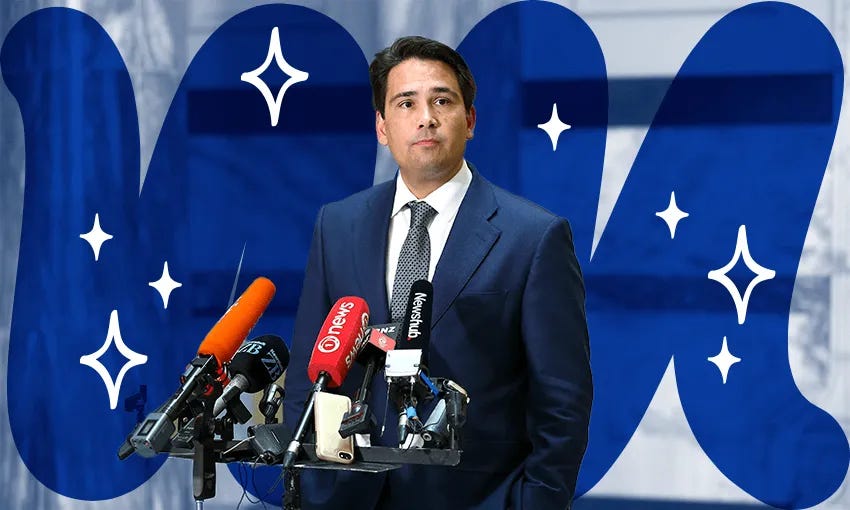The coming wave of long Covid
The country needs to prepare for what’s next after omicron, thousands of cases with the debilitating and long-term condition
Mōrena and welcome to The Bulletin for Wednesday, March 16, by Justin Giovannetti. Presented in partnership with Z Energy.
In today’s edition: Increased aid for Ukraine; National’s Bridges quits parliament; intelligence agencies warned of anti-government violence; but first, the threat from long Covid.
There are more questions than answers about long Covid. (Image: RNZ / Vinay Ranchhod)
A wave of long Covid is likely to follow the omicron outbreak.
Health experts are warning the country to prepare for what could months or years of long Covid cases after the soaring number of infections in the omicron outbreak. On New Year's Day fewer than 15,000 New Zealanders had tested positive for Covid over the course of the entire pandemic. The daily tally of new infections is now often higher than that and the country’s case total is nearing 400,000. About 10% of those cases are expected to continue experiencing Covid symptoms three months after contracting the virus. There are still numerous questions about long Covid, but it has been linked to a number of disparate symptoms, including fatigue, brain fog, chest pain, muscle weakness as well as loss of taste and smell. As experts told RNZ, it needs to be taken very seriously.
There is one significant way to lower the risk of long Covid.
“Rest, rest, rest”. That’s the advice from Mona Jeffreys, a senior research fellow at Victoria University. She’s part of a study looking at the short and long-term impacts of the virus in Aotearoa, including long Covid. Speaking to The Bulletin, she said that the best way to avoid lasting symptoms is to take lots of rest during a Covid infection. Don’t push through, don’t try to burn it off. Rest. Director-general of health Ashley Bloomfield and his chief science advisor, Ian Town, echoed her advice during a press conference yesterday. According to the Dominion Post, the government is now establishing a group to figure out how the health system will deal with long Covid.
There’s much about long Covid that’s still being discovered.
Long Covid can follow either mild symptoms or severe ones. It’s unclear if omicron will cause any fewer cases of long Covid than delta or variants before it. Long Covid seems to appear in many patients who have immune systems that were disrupted by a Covid infection and then never completely calmed down. That can set off a chain of vastly different symptoms across the body. The result can be debilitating, exhausting and last years. We really don’t know how long it might last. The New York Times has explored some of the causes of long Covid. As Bloomfield and Town said yesterday, it’s clearly not psychological. Long Covid is real. Doctors and patients need to try to recognise it and treat the symptoms as soon as they can.
The situation in New Zealand is likely to change in the coming months.
By definition, no one in New Zealand with omicron has developed long Covid yet—symptoms need to last at least 12 weeks. However that will start changing soon as the first omicron cases pass that threshold. It’s likely many cases are already suffering from symptoms that won’t go away. While long Covid clinics have been established in the US and across Europe, none are in Aotearoa yet. That will likely change. Jeffreys and the Victoria University study have already collected thousands of reports from people with long Covid from delta and earlier cases.
“Some of the stories we’ve had back are people living with it for 18, 20, 22 months. It’s really heartbreaking,” she said. But her concern is looking forward, at the massive omicron bump. “If we’re talking about 10% of those people still having symptoms at 12 weeks and half of them having symptoms a year later, that’s a huge burden on the healthcare system that we need to take seriously.”
The Spinoff’s Covid data tracker has the latest figures.
The generous support of our members powers all of The Spinoff's journalism, including live updates, the award-winning collaborations between Toby Morris and Siouxsie Wiles, and richly reported feature writing.
As we continue to struggle against commercial headwinds, contributions from our members are more critical than ever. If you value what we do and have the means to do so, please make a donation today and support our mahi.
Government increases aid, visas for Ukraine.
Over 4,000 Ukrainians will soon be able to move to Aotearoa under an expansively-defined family reunification programme. As RNZ reports, immigration minister Kris Faafoi announced the government’s special Ukraine policy yesterday. It’ll be open for a year and give applicants a two-year work visa. It’s the largest special visa category in the country’s history. The Russian war in Ukraine is entering a deadly phase, with sieges of cities and reports of executions in the streets of occupied towns by Russian soldiers. The Guardian has looked at the situation facing Ukrainians stuck behind slowly advancing Russian lines.
Former National leader Simon Bridges quits parliament.
The announcement came without warning yesterday: After 14 years at parliament, Bridges is quitting politics in the coming weeks. Only 15 minutes later he was at a press conference, standing alone, making it official. Toby Manhire looks at the move for The Spinoff, which has left many people scratching their heads. Bridges was adamant that there’s no scandal ahead, only a promising career for him in business, and maybe, media. He dropped the hint so many times that he very likely has some media gig lined up. Keep in mind, Judith Collins had gone rummaging for scandal last year and found very little. The Spinoff has also looked at the 10 top moments of his political career.
Intelligence agencies warned of potential for violent protests over Covid measures.
A newly declassified terror report from last November warned the government that agencies and police were tracking “anti-authority” movements with violent rhetoric likely to oppose vaccination mandates and lockdowns. As Stuff reports, the threat assessment warned of possible violence and sabotage. Testing and vaccination facilities were seen as possible targets. Three months later, protesters headed to parliament for an occupation that ended in a violent riot.
Australian court overturns ruling that the country’s environment minister must consider harms to children from climate change.
In a unanimous ruling, Australia’s federal court decided that the country’s environment minister doesn’t have a duty of care to shield children from the harms of climate change when approving new coal mines. As Reuters reports, environment minister Sussan Ley had appealed an earlier ruling in relation to her approval of a coal mine extension in the state of New South Wales.
One of the country’s largest libraries was left unstaffed and open for hours. Nothing was stolen.
Tess McClure has reported for The Guardian on the incredible situation on Waitangi Day when Tūranga in Christchurch opened automatically. Hundreds of people went into the central library, browsed and borrowed books using automated terminals. There was no staff or security. One visitor left an angry note because they couldn’t find a librarian to help. So far it seems nothing was stolen or vandalised. The library is trying to ensure it doesn’t accidentally open again.
Got some feedback about The Bulletin, or anything in the news? Get in touch with me at thebulletin@thespinoff.co.nz
Simon Bridges in 2020. (Hagen Hopkins/Getty Images; additional design by Archi Banal)
Liam Hehir writes that for Simon Bridges, it just wasn’t written in the stars. Chris Schulz reports on a suburban menswear store calling it quits after 60 years. Sam Brooks reviews Dressed, it’s New Zealand history, but also fashion. Emily Writes looks at the meaning of a place at the table. Sela Jane Hopgood explains how after years of setbacks, and a pandemic, a Pasifika Aladdin rises again.
Just one more game…
American football legend Tom Brady astounded earlier this week when he announced that he wasn’t going to retire after all. The NFL quarterback is returning for another season, only 40 days after he ended a career that saw him win seven Super Bowls. Stuff looks at six other sports greats who decided to come back after calling it quits.













